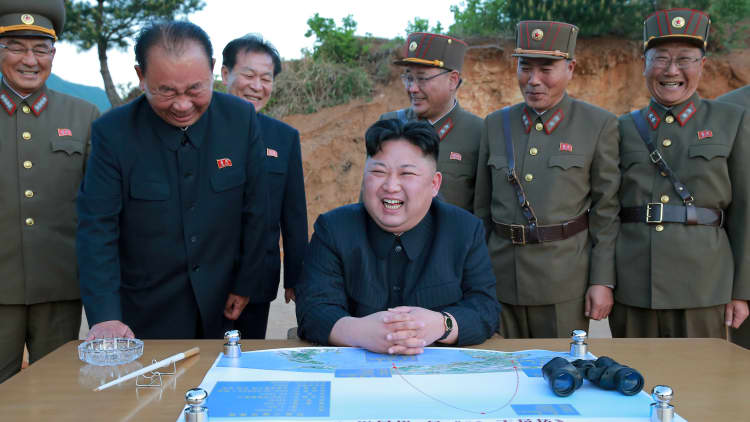
Investors are underestimating the risk of tensions between the U.S. and North Korea, former NATO Supreme Allied Commander Wesley Clark told CNBC on Wednesday.
"I'm an investment banker also. ... I see a market generally under recognizing geostrategic risk," said Clark, now chairman and CEO of Wesley K. Clark & Associates. "Risk in Northeast Asia is rising. But here's the truth: There's no easy military solution."
U.S. stocks were modestly lower on Wednesday, one day after President Donald Trump warned North Korea that any threat to the United States would be met with "fire and fury." The Dow briefly fell more than 60 points on Tuesday after the news before finishing about 33 points lower, ending a 10-session win streak and a run of nine consecutive all-time high closes.
Clark, who was NATO commander under President Bill Clinton, said on "Squawk Box" that perhaps another reason investors haven't reacted strongly to Trump's comments is because they know there has been tension with North Korea for a long time.
"They know the United States intends to fulfill its obligations to our allies in the region, and they see the rhetoric as nothing but rhetoric at this point," added Clark, who unsuccessfully ran for the 2004 Democratic presidential nomination.
Trump made his remarks hours after reports that Pyongyang had successfully created a miniaturized nuclear weapon designed to fit inside its missiles. North Korea has repeatedly vowed retribution against the U.S. following sanctions or other measures meant to deter its nuclear and missile programs.
Clark said Trump's comment was likely to reinforce the United States commitment to South Korea. But the way the president came across was more "bellicose," he said. "We don't want to get in a name calling contest with the North Koreans."
Later Tuesday, North Korea's state media said the country was considering a strike on the U.S. Pacific territory of Guam with mid- to long-range missiles, according to Reuters. On Monday, it said it will launch "thousands-fold" revenge against the United States after the United Nations imposed new sanctions on Pyongyang for its nuclear and missile programs.
On Wednesday, Trump issued followup tweets saying: " Hopefully we will never have to use this power."
Opportunities in geopolitical risk
Also on "Squawk Box," former JPMorgan global market strategist Anastasia Amoroso said the markets are reacting as one might predict. She advised investors to look to a safe haven — gold.
"If you look at gold volatility, it's actually the lowest level it has been in 10 years," Amoroso said.
Traditional global safe-haven trades like gold and the Swiss franc rose Wednesday as tensions between the United States and North Korea escalated.
Amoroso said it is difficult to predict the outcome of North Korea's threats but investors do know "which way the sanctions are going."
"China is looking to export less or actually no coal at all from North Korea. So, somebody might have to fill the void in coal imports in China," she said.


